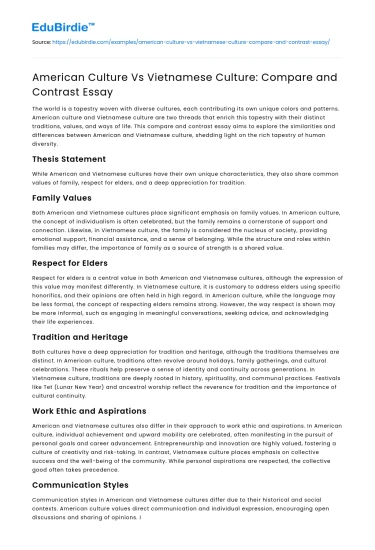The world is a tapestry woven with diverse cultures, each contributing its own unique colors and patterns. American culture and Vietnamese culture are two threads that enrich this tapestry with their distinct traditions, values, and ways of life. This compare and contrast essay aims to explore the similarities and differences between American and Vietnamese culture, shedding light on the rich tapestry of human diversity.
Thesis Statement
While American and Vietnamese cultures have their own unique characteristics, they also share common values of family, respect for elders, and a deep appreciation for tradition.
Save your time!
We can take care of your essay
- Proper editing and formatting
- Free revision, title page, and bibliography
- Flexible prices and money-back guarantee
Family Values
Both American and Vietnamese cultures place significant emphasis on family values. In American culture, the concept of individualism is often celebrated, but the family remains a cornerstone of support and connection. Likewise, in Vietnamese culture, the family is considered the nucleus of society, providing emotional support, financial assistance, and a sense of belonging. While the structure and roles within families may differ, the importance of family as a source of strength is a shared value.
Respect for Elders
Respect for elders is a central value in both American and Vietnamese cultures, although the expression of this value may manifest differently. In Vietnamese culture, it is customary to address elders using specific honorifics, and their opinions are often held in high regard. In American culture, while the language may be less formal, the concept of respecting elders remains strong. However, the way respect is shown may be more informal, such as engaging in meaningful conversations, seeking advice, and acknowledging their life experiences.
Tradition and Heritage
Both cultures have a deep appreciation for tradition and heritage, although the traditions themselves are distinct. In American culture, traditions often revolve around holidays, family gatherings, and cultural celebrations. These rituals help preserve a sense of identity and continuity across generations. In Vietnamese culture, traditions are deeply rooted in history, spirituality, and communal practices. Festivals like Tet (Lunar New Year) and ancestral worship reflect the reverence for tradition and the importance of cultural continuity.
Work Ethic and Aspirations
American and Vietnamese cultures also differ in their approach to work ethic and aspirations. In American culture, individual achievement and upward mobility are celebrated, often manifesting in the pursuit of personal goals and career advancement. Entrepreneurship and innovation are highly valued, fostering a culture of creativity and risk-taking. In contrast, Vietnamese culture places emphasis on collective success and the well-being of the community. While personal aspirations are respected, the collective good often takes precedence.
Communication Styles
Communication styles in American and Vietnamese cultures differ due to their historical and social contexts. American culture values direct communication and individual expression, encouraging open discussions and sharing of opinions. In Vietnamese culture, indirect communication is often preferred to maintain harmony and avoid conflict. The concept of "saving face" is significant, and communication may involve subtleties and nonverbal cues.
Cuisine and Culinary Traditions
Food is a powerful cultural expression, and both American and Vietnamese cultures boast vibrant culinary traditions. In American culture, cuisine is a melting pot of influences, reflecting the nation's diverse population. Fast food culture, convenience, and large portion sizes are notable aspects. Vietnamese cuisine, on the other hand, emphasizes freshness, balance, and the harmonious blending of flavors. Rice, vegetables, and herbs play a central role in Vietnamese dishes, reflecting the country's agricultural roots.
Conclusion: Embracing Diversity and Shared Values
In conclusion, the comparison and contrast between American and Vietnamese cultures reveal a rich interplay of traditions, values, and ways of life. While distinct differences exist, both cultures share common values of family, respect for elders, and a deep appreciation for tradition. Embracing cultural diversity allows us to appreciate the beauty of the tapestry woven by humanity, a tapestry that is enriched by the threads of American and Vietnamese cultures and countless others around the world.






 Stuck on your essay?
Stuck on your essay?

